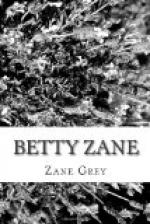“Wetzel’s compliments,” muttered Jonathan. “But the mischief is done. Look at that damned burning arrow. If it doesn’t blow out the Fort will go.”
The arrow was visible, but it seemed a mere spark. It alternately paled and glowed. One moment it almost went out, and the next it gleamed brightly. To the men, compelled to look on and powerless to prevent the burning of the now apparently doomed block-house, that spark was like the eye of Hell.
“Ho, the Fort,” yelled Col. Zane with all the power of his strong lungs. “Ho, Silas, the roof is on fire!”
Pandemonium had now broken out among the Indians. They could be plainly seen in the red glare thrown by the burning cabin. It had been a very dry season, the rough shingles were like tinder, and the inflammable material burst quickly into great flames, lighting up the valley as far as the edge of the forest. It was an awe-inspiring and a horrible spectacle. Columns of yellow and black smoke rolled heavenward; every object seemed dyed a deep crimson; the trees assumed fantastic shapes; the river veiled itself under a red glow. Above the roaring and crackling of the flames rose the inhuman yelling of the savages. Like demons of the inferno they ran to and fro, their naked painted bodies shining in the glare. One group of savages formed a circle and danced hands-around a stump as gayly as a band of school-girls at a May party. They wrestled with and hugged one another; they hopped, skipped and jumped, and in every possible way manifested their fiendish joy.
The British took no part in this revelry. To their credit it must be said they kept in the background as though ashamed of this horrible fire-war on people of their own blood.
“Why don’t they fire the cannon?” impatiently said Col. Zane. “Why don’t they do something?”
“Perhaps it is disabled, or maybe they are short of ammunition,” suggested Jonathan.
“The block-house will burn down before our eyes. Look! The hell-hounds have set fire to the fence. I see men running and throwing water.”
“I see something on the roof of the block-house,” cried Jonathan. “There, down towards the east end of the roof and in the shadow of the chimney. And as I’m a living sinner it’s a man crawling towards that blazing arrow. The Indians have not discovered him yet. He is still in the shadow. But they’ll see him. God! What a nervy thing to do in the face of all those redskins. It is almost certain death!”
“Yes, and they see him,” said the Colonel.
With shrill yells the Indians bounded forward and aimed and fired their rifles at the crouching figure of the man. Some hid behind the logs they had rolled toward the Fort; others boldly faced the steady fire now pouring from the portholes. The savages saw in the movement of that man an attempt to defeat their long-cherished hope of burning the Fort. Seeing he was discovered, the man did not hesitate,




